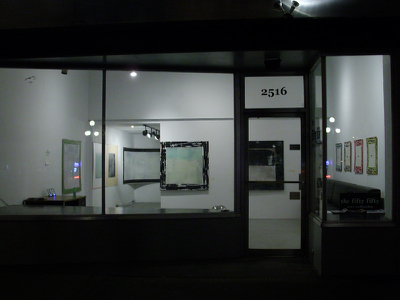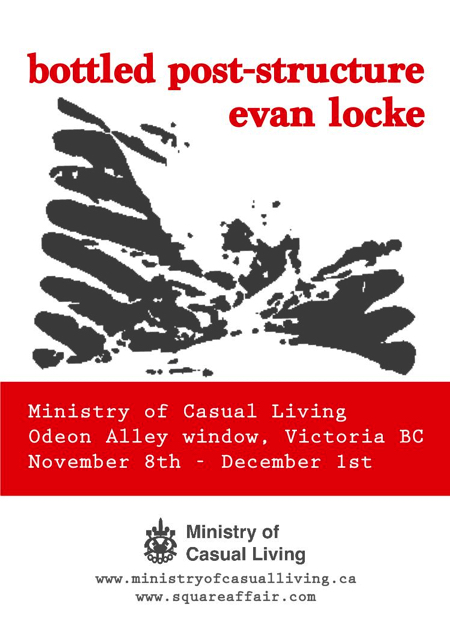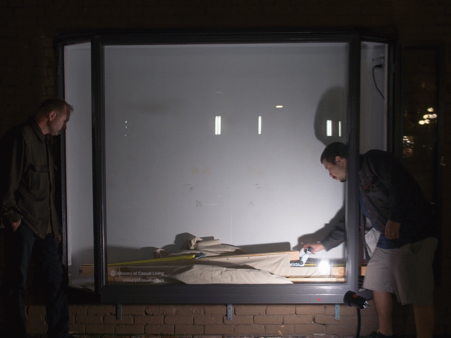2021/2022 Commercial Alley Installation
"Proximate Approximate" is a series of 1:1 stamp-like impressions mirroring the alley wall immediately opposite each of the four panel locations. The work portrays the fictitious result of the walls of the alley coming together and touching, leaving the depicted impressions. This site-specific reflection of the built environment places viewers within the space of the implied action, inviting the public to contemplate their own tangible relations to the place itself.

Being Here at Arc.Hive
Exhibition runs October 9-25 and will be open to the public Saturdays and Sundays (one or two people at a time) Noon to 4pm.
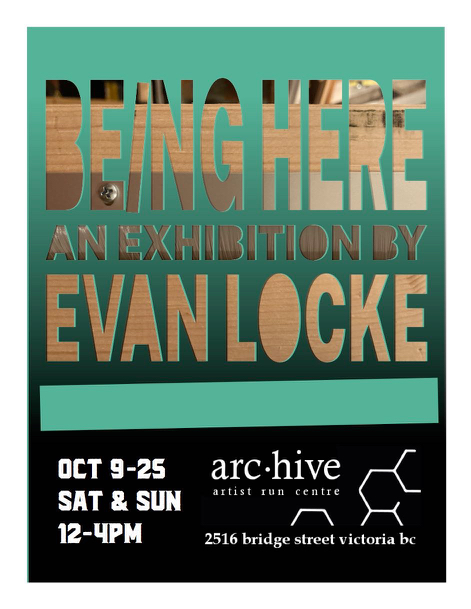
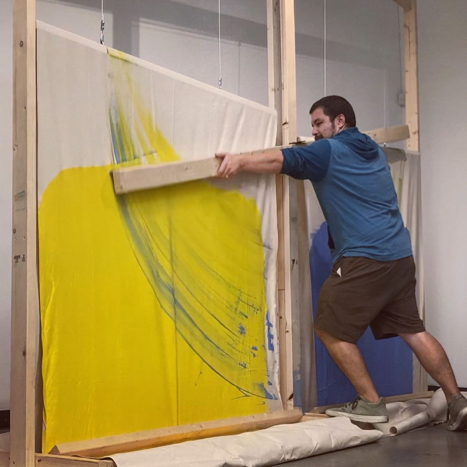
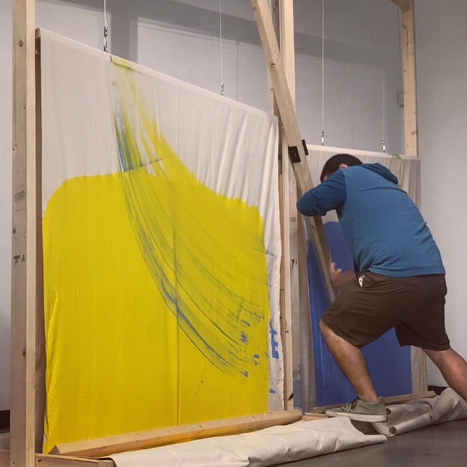
See video of painting being completed HERE
Spread, Disperse, Contract at the Victoria International Airport



Immediacy Protracted at Oxygen Arts Centre
Residency dates: June 04-June 13th
Exhibition dates: June 15th to July 12th, 2019
Opening Reception: Friday, June 14th at 7-9pm
Artist talk: Saturday, June 15th at 4pm
Gallery and Residency hours: Wednesday to Saturday from 1-5pm
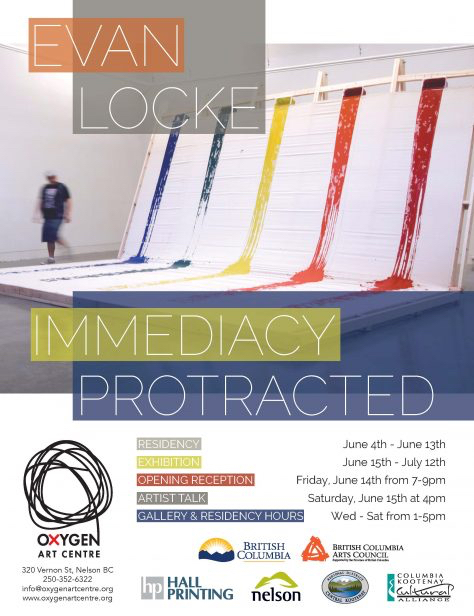
Find out more from Oxygen Arts Centre
Pending Approval
‘Pending Approval’ is five simultaneous solo exhibitions by UVic MFA graduate students Hjalmer Wenstob, Maddy Knott, Evan Locke, Heather Koning and Carrie Walker. The exhibition at the University of Victoria Visual Arts Building runs April 29th to May 6th. Opening reception is Saturday April 29th 7-10pm

post painting at The Hatch Gallery, UBC

Click HERE to see the installation and painting of the work.
Artemis Feldman on 'bottled post-structure'

Bottled Post Structuralism: Where Evan Locke questions the Painter’s hand
by Artemis Feldman
Evan Locke is an MFA student at UVic working with wood, canvas, and paint. His most recent work, Bottled Post Structuralism, on display at the Ministry of Casual Living, is another iteration of those material themes. There is a mystery to the work in its display. Behind glass, what appears to be a nonsensical structure plays as a monument to a loosely draped canvas which sports abstract gestures in paint. The language of the work is at first unintelligible, but becomes clear in the greater body of Locke’s work.
The monument here is not an ornament, nor language, nor a method of presentation, but an apparatus. Locke has often chosen to decline the body as an apparatus of art and reject the artist as a designer or aesthetic. Locke therefore must construct a figure to mirror himself as the artist and make the actual painting. In the construction of the apparatus, Locke has built a reflection of an artist that in his work there are now two creators. Locke has denied aesthetic choice and taken on the role of the engineer and his apparatus forms a reflection of the artist that applies the paint, but this is a poor copy made of metal and wood. Here, Locke’s apparatus becomes the artist without the mind where every action leads to art as an immediate event.
The focus of Locke’s work, though, is not to envision a mechanical world full of mindless art machines, but to remove the painter’s hand and leave the art-making as a process the viewer can understand and, in their minds’ eyes, replicate. Because Bottled Post Structuralism is an art object, one cannot help but aestheticize it. This is why Locke carefully directs people to think of the construction by leaving the apparatus as the double function of painting and display. The unfinished quality of Locke’s wood refers to its own construction, and simplicity of form as well as an obvious functionality allow the viewer to understand every step that leads to the finished painting. Locke here has taken great influence from prototypes and instructions for building furniture. He asks himself what kind of construction allows that a painting be made as simple as possible: fundamental and functional. In this focus, Locke retreats from the role as author and artist, hopeful that the viewer can picture him or herself in his place.
When there is an artist involved in a process that makes marks, there is a mystery to the artist’s mind: the element of time and the understanding of aesthetic values do their work on the mind and choices are made. This leads to an eventuality that is the completed work. In the Casual Living Display, Locke rejects both aesthetic values and the mind in the process of applying paint. Therefore, when it comes to making marks, there is no eventuality. The focus, then, is causality. Locke works with actions and their results, where the mystery lies in the conception of the mark-making apparatus.
It might be important to specify that this work involves an action rather than gesture, as a gesture is a moment in time captured or not captured by the attention of a viewer; all documents of the gesture are not the gesture itself. No matter how effective the documentation of the gesture is, the gesture itself is, by definition, lost. In the case of Evan Locke, all time and motion is on a direct path to the recorded mark. Locke, in fact, refers to his completed works as artifacts of a moment in time, implying that the physical piece is just as valuable as the moment to which it refers. Therefore, all movements that could be defined as gestures made are made in preparation for documentation, and can be thus encapsulated by the completed work.
Locke’s art is at its core direct and directional. That his work is direct is evident in the focus on immediacy. All that could be veiled is revealed and all that is revealed is focused around the single action of one mark made. The quality of directionality, which is inseparable from Locke’s work, is the focus of causality where every action leads to one single effect (the making of a mark) and after that, the work is complete.
To Locke, having one motion be clear and direct is important so that one may reverse-engineer the action as one views the piece. This unwinding of time speaks again to the raw materials and mark making display. Locke believes in keeping his work rigorously honest. He displays a desire to dispel all mystery in his work by these actions, but it is unclear that this ideal will ever be attained.
It is impossible to avoid awe in Locke’s monumental and structural paintings. Even when one knows exactly how they are made, still more questions are raised. How could Locke possibly conceive of such a poetically simple way to paint? How did he engineer these machines? How did he acquire such knowledge of structure, form, and materials to make these elegant and stark sculptures? Despite knowing that the only thing that could lead to these specific masteries could only be extensive study and practise, it is still challenging to avoid the temptation to put some stock in artistic genius. This is where layers of mystery and opacity fall back into the work. All his efforts cannot be revealed in such a considered process, and I believe that in the end, one would never be able to create their own Evan Locke; though maybe his hand is not in the painting, his mind still overshadows the design.
The question is raised, then, as to whether the work is still successful. Despite the opacity of Locke’s conception for his pieces and the failure to completely purge his work of the romance of painting, at every step, a new question is raised. The tradition of art making is questioned when Locke inverts the element of time in the art making process. To make a frame that makes the mark is to force the value of presentation to be questioned as well as to question the value of a laboured and considered painting. The marks of Locke’s painting further are not reliant on the frame, as these forceful and improvised actions do not require the frame to have a visual impact. The frame is necessary for the action to become an artifact, which unlocks the viewers capacity to reverse engineer the work, but the painting may still have impact without these sculptural elements. The apparatus is then an object to be looked upon as that which constructs the painting while destabilizing the tradition of first conceiving of a piece,then creating it, then considering its presentation. The apparatus destabilizes the artist’s vantage, the value of presentation, and the temporal expectations of an artist at work. Locke’s pieces question and criticize the tradition of art making, the value of art education, and the separation of the viewer and artist.
bottled post-structure
Duo Show with Luke Garrison at Polychrome Fine Arts


Running October 13 - 27 @ polychromefinearts
Expressions in Abstract
learn more at http://burnabyartscouncil.org

The show opens Saturdy the 7th and runs the month of February.
Beautiful Decay
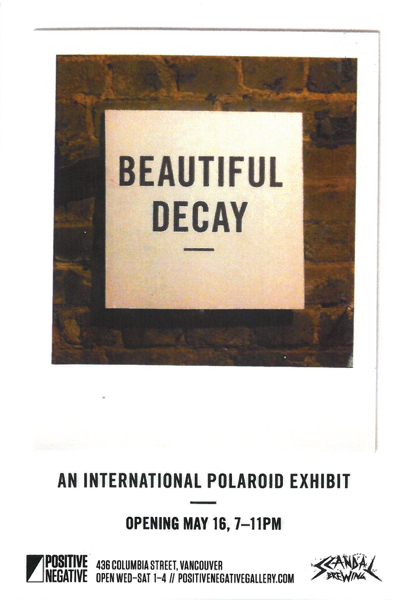

"Beautiful Decay" sharpens its gaze on disorder and desolation, where memories are forgotten and left behind, and the laws of entropy take hold: the cracks and blood and decay of modern life. Everything grows older, yet is beautiful in its release.
"Beautiful Decay" has artist works from Germany, Sweden, England, Italy, Czech Republic, Australia, Brazil, and all across the United States and Canada. There won't be another place to see these one-of-a-kind pictures on any continent.
The show opened on Thursday, May 16, and will runs until June 1. The gallery is open Wednesday–Saturday 1–4 PM.
A few pictures from the show and my personal contribution, ‘permanence’ (Shot with Polaroid ProCam and close-up lens on Impossible PZ600 Silver shade Blank Frame film and featuring a brass nail)


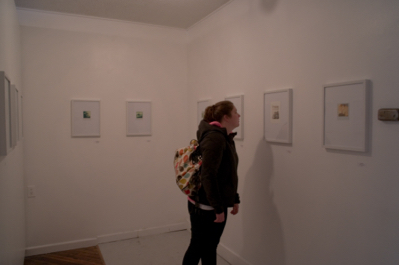
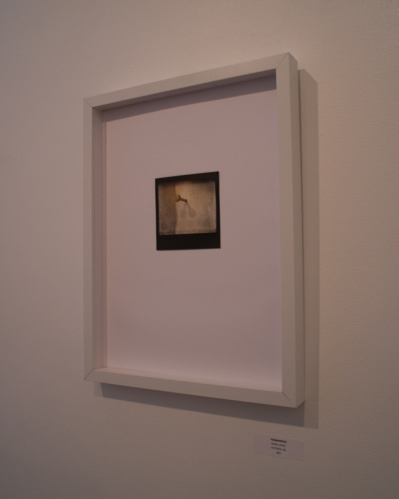
Positive Negative is a neat gallery run by Adam Lupton (you can see him in one of the pictures above), you can see what they are about and some upcoming shows here
Putting Holes in Things
I decided to make a one-off new piece for the show, the Ministry has been a brilliant spot for a number of artists, including myself, and in the spirit of the eviction event, making the most of it seemed appropriate. The main work is called ‘Look at my Backside’, featuring a suspended, double-sided hardboard painting with a peephole through the middle which allows you to see the back of the painting, it is accompanied by three smaller paintings titled ‘Pinups’.


A nice surprise on the night of the event, Efren Quiroz of Exhibit-v showed up with his camcorder and did his thing:
Trash bag, Peepshow, Glory hole (w/ Phil Osborne)
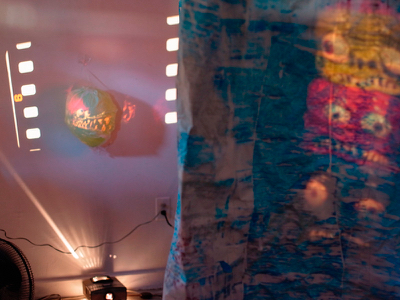
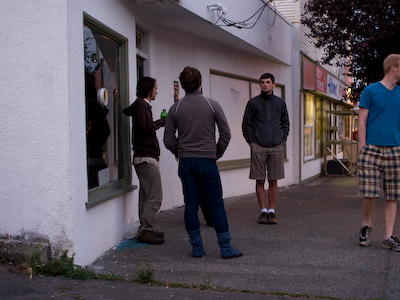
Brass Tack Tact
The new works reflect a different direction, into more physical, object-like forms for my paintings. The themes are rather introspective, of both the practice of painting itself, as well as a recent 5 week trip through Europe in which I was able to take in the 2009 Venice Biennale and Art Basel. The trip not only inspired the work, but affected a reassessment of my own art practice.

I met Efren Quiroz of Exhibit-v as a result of this show. He is amazingly dedicated to documenting the arts community in Victoria, one exhibition at a time, keep your eyes out for a man with a camcorder the next time you drop into an art show in Victoria:
Dialectic (w/ Jenn Boyd)
sculptures and drawings incorporating natural bees wax by Jenn Boyd, and my own paintings are a reflection of contradictory aesthetics stemming from a common urban/architectural inspiration. the show was put together while sharing a studio together in Victoria’s historic Chinatown.


Constructivision


H*T SH*T
I was awarded with the Royal Canadian Academy of Arts’ 2008 C.D. Howe Scholarship for my contribution in this end of year showcase.


benefit for material awareness
